Barr departing Justice Department following tenure packed with controversy
Despite tensions, Barr remained one of Trump's most reliable defenders.
Attorney General William Barr's resignation from the Justice Department became official Wednesday, bringing a close to one of the most controversial tenures for an attorney general in modern history and after months of growing tension in his now-soured relationship with President Donald Trump. Trump had grown incensed over Barr's refusal to announce investigations into Trump's political opponents as well as baseless claims of widespread fraud in the 2020 election.
"Over the past two years, the dedicated men and women of this Department—including its operational components—have risen to meet historic challenges and upheld our vital mission to enforce the rule of law," Barr wrote in his final note to DOJ staff Wednesday. "I have been continually inspired by your professionalism and outstanding work. As I did almost 30 years ago, I leave this Office with deep respect for you, and I will always be grateful for your devoted service to the Nation we love.”
For more than a year and a half since the start of his second tenure as the nation’s attorney general, Barr has drawn fire over his efforts to undermine the investigation into Russia's efforts to interfere in the 2016 election and his repeated interventions in matters of direct interest to Trump.
In recent weeks, though, Barr sought to publicly distance himself from Trump's efforts to overturn the results of the 2020 election. In an interview with the Associated Press, Barr said the department had found no evidence of voter fraud that could change the election's outcome. And in a news conference Monday, Barr said he saw no reason for the appointment of special counsels into election fraud or the tax investigation of President-elect Joe Biden's son Hunter Biden.
Barr also said he saw no basis for the seizure of voting machines around the country, a proposal the president and his allies had been floating in recent private meetings according to sources.
Prior to his relationship with Trump cooling, Barr had proven to be one of the president's most reliable defenders.
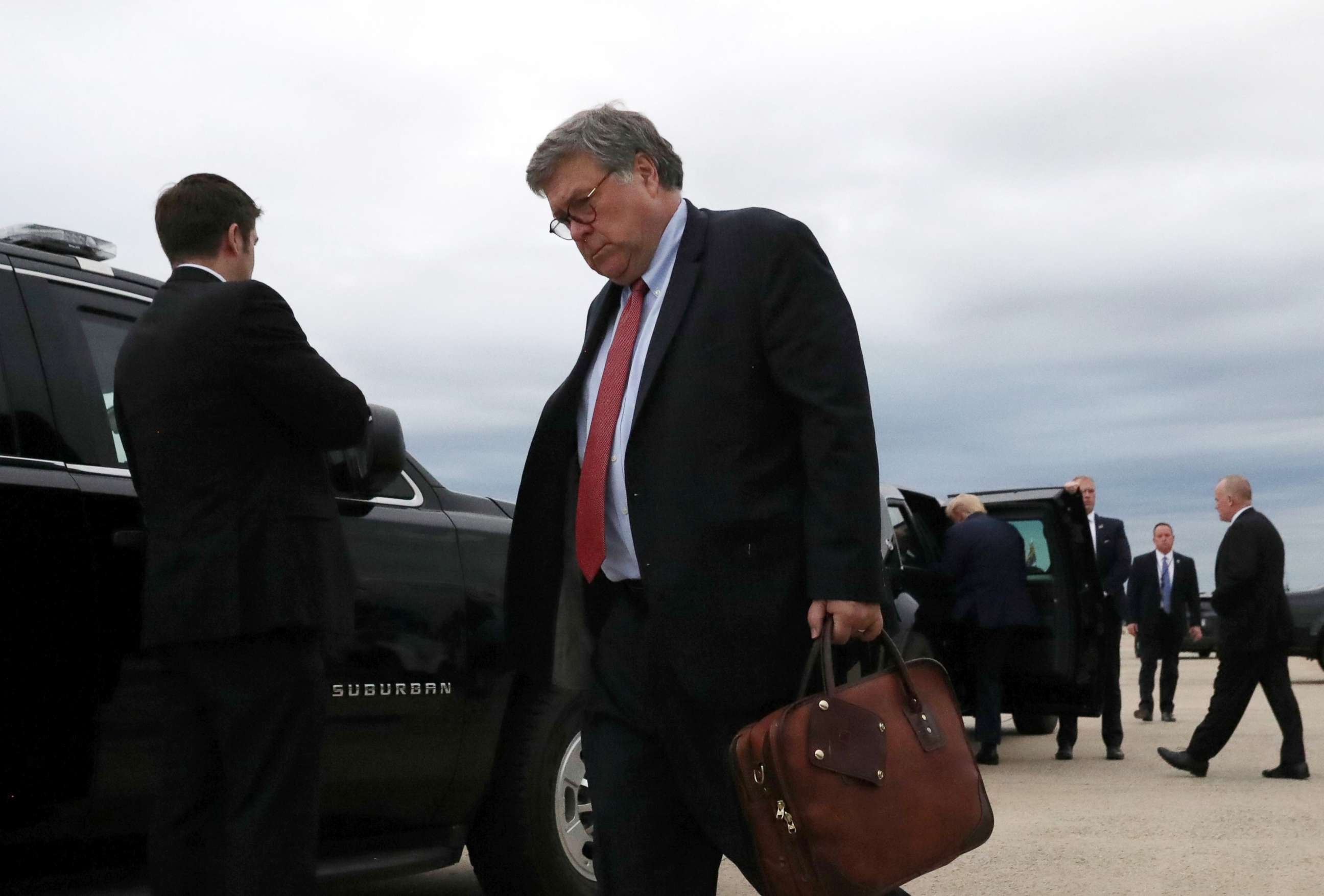
In his resignation letter he hand-delivered to Trump at the White House last week, Barr made no mention of the tensions that developed with Trump, and instead heaped praise upon the president who had for weeks publicly vented his frustrations with Barr.
"I am proud to have played a role in the many successes and unprecedented achievements you have delivered for the American people," Barr wrote. "Your record is all the more historic because you accomplished it in the face of relentless, implacable resistance."
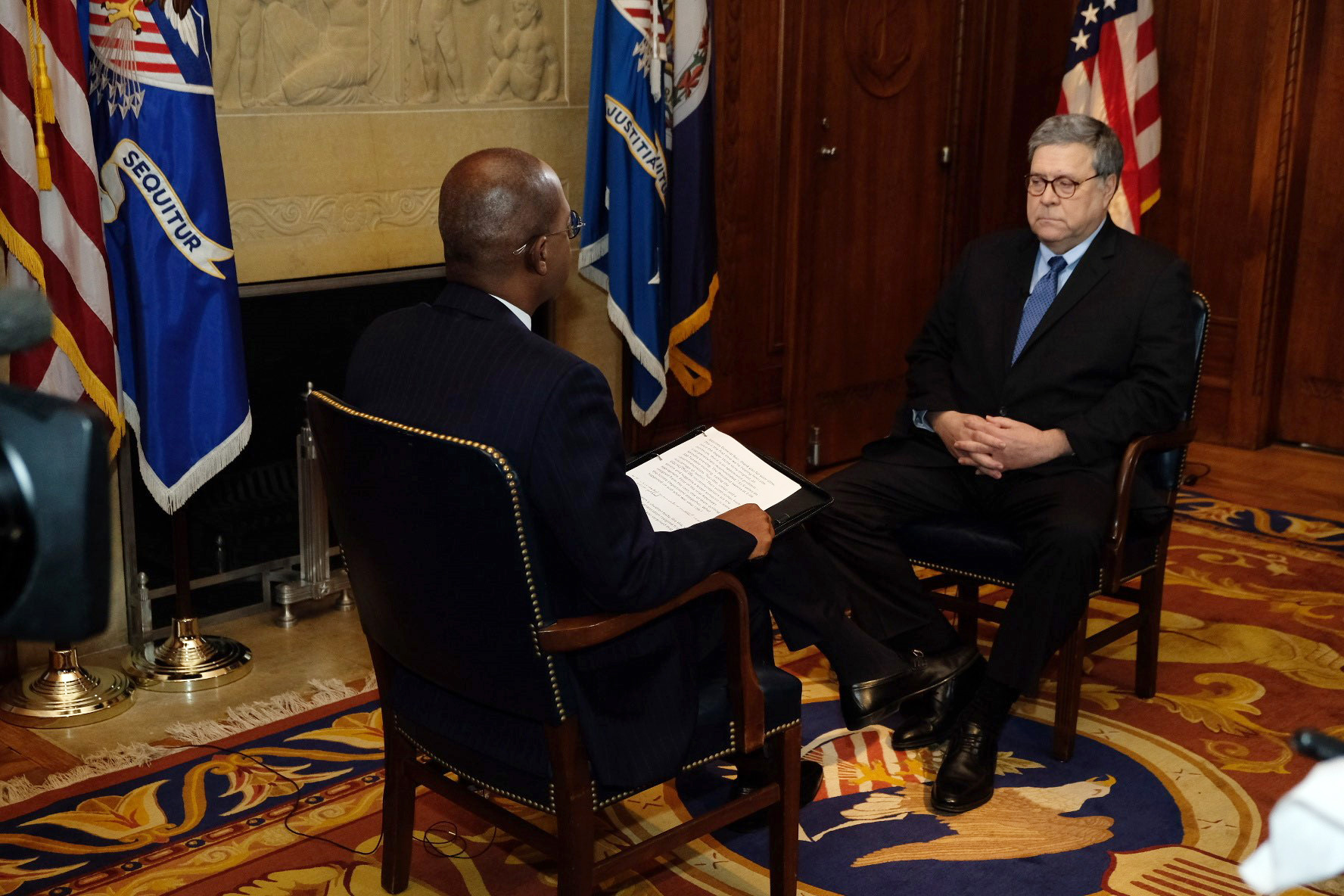
In interviews, Barr would often echo Trump's unfounded claims that a cabal of corrupt Obama administration officials conspired to overturn his election.
Over the summer, Barr dispatched federal law enforcement officers across the country as Trump publicly called for police to forcefully crack down on rioters damaging property and causing violence following the death of George Floyd -- even ordering the dispersal of a crowd of peaceful protesters gathered in front of the White House that cleared the way for Trump to stage a photo op at a nearby church.
And before his most recent statements confirming the department had uncovered no widespread fraud that could overturn the results of the 2020 election, during the COVID-19 pandemic Barr was among those repeatedly pushing conspiracies about foreign countries being able to mail in millions of ballots into the U.S.
"Good for him for finally stopping the godawful onslaught that he engaged in," said former deputy attorney general Donald Ayer, who served alongside Barr, during the attorney general’s first tenure in the George H.W. Bush administration but has since become one of his most vocal critics. "But everything he did, will stand as a monument to inappropriate behavior by an attorney general."
Amid criticism and calls for his resignation or impeachment from current and former federal prosecutors, Democrats and activist groups, Barr remained defiant as he charged forward with his long-held belief in shoring up power in the presidency.
For many conservatives and proponents of the 'unitary executive' legal theory to which Barr subscribes, Barr will be remembered more for his work to rein in what they believe was an FBI and DOJ untethered from accountability by those elected to office, than any of his more controversial decisions hyped by critics as politically driven.
"Of course the things he did were extremely controversial but I think when history looks back they're going to see that he came into the office -- contrary to accusations, not because he was Donald Trump's wing-man," said John Yoo, a law professor at Berkeley who previously served as deputy assistant attorney general under President George W. Bush. "But I think he came in to sort of restore that kind of control by politically-appointed officials over the Justice Department."
Once cast as a relatively non-controversial replacement for attorney general Jeff Sessions, Barr later earned the nickname 'Buffalo' among allies in the department as he cemented a legacy as one of the most divisive and norm-breaking figures of the Trump presidency.
In return to DOJ, a commitment to remain 'independent'
Barr's Senate confirmation in February 2019 came as the department was already beset by turmoil and repeated attacks from President Trump, amid speculation over whether Trump might move to fire former special counsel Robert Mueller before the completion of the Russia investigation.
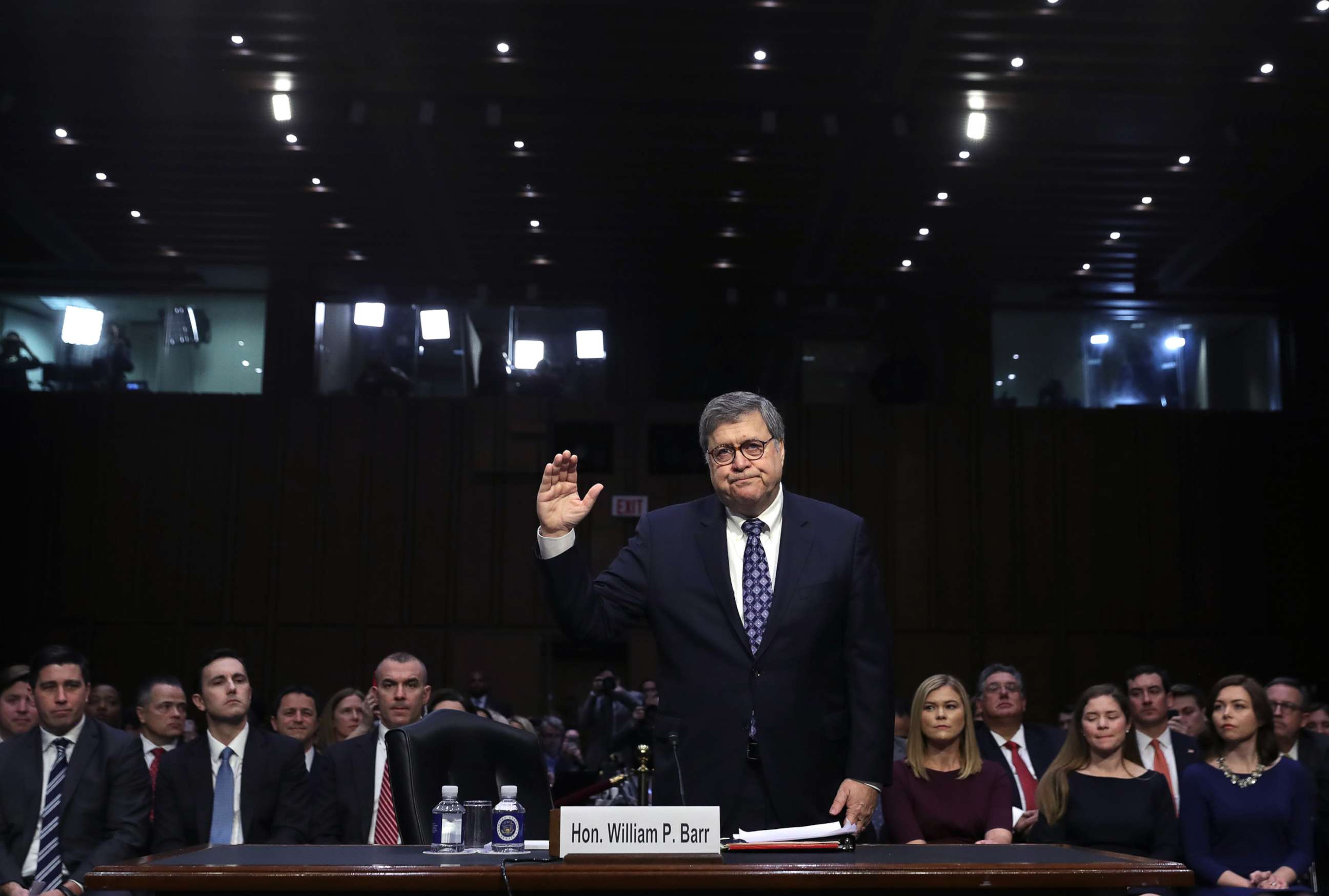
While news of Barr's nomination was initially met with some relief by several moderate Democratic senators, it was soon revealed that he had authored an unsolicited 19-page memo sent to Justice Department leadership several months earlier, where he cast doubt on the basis of Mueller's probe of President Trump for potential obstruction of justice.
Barr defended the memo as "entirely proper" and said it was not based on any internal knowledge of Mueller's investigation -- while Democrats argued it was clearly intended to catch the attention of lawyers close to President Trump, who at the time was actively attacking Sessions for declining to intervene against Mueller's work.
Under fire, Barr committed to senators that he would not move to fire Mueller without proper cause, while at the same time agreeing with concerns expressed by several Republicans on the committee that reports of misconduct by FBI agents involved in the investigation of Trump's campaign should be further examined. He described Mueller as a "good friend," and said he would share as much as possible of Mueller's final report "consistent with regulations and the law."
Barr, who had become a multi-millionaire outside government in his position as general counsel for GTE corporation and its successor company Verizon, used the hearing to explain his decision to return to work in government at such a tumultuous moment.
"One of the reasons I ultimately decided that I would accept this position if it was offered to me was because I was -- I feel that I am in a position to be independent," Barr said. "I feel I am in a position in life where I can do the right thing and not really care about the consequences in the sense that I do not -- I can truly be independent."
In a podcast interview this past summer, however, Barr gave a noticeably different explanation for accepting the position.
"At the end of the day, I saw the department being used as a political weapon in our system," Barr said. "This idea of 'resisting' a duly-elected President of the United States and using every device to impair his administration was disastrous and I thought that he needed an attorney general at that point, and I agreed to do it."
After nearly two years in office, however, Barr revealed no evidence indicating such a grand conspiracy against Trump or his administration.
The Mueller Report
Perhaps no other episode of Barr's tenure has been more harshly examined or scrutinized than his eventual handling of Mueller's final report and the manner in which he cast its damning findings about President Trump's conduct while in office.
On March 22, 2019, Barr wrote in a letter to Congress that Mueller's investigation had been completed and that he anticipated being able to advise lawmakers of his underlying conclusions as early as the weekend. Over the course of his nearly two-year probe, Mueller's team indicted more than 30 individuals and three Russian businesses on charges ranging from computer hacking to conspiracy and financial crimes.
Two days later, Barr released a now-infamous two-page letter outlining what he described as the "principal conclusions" from Mueller's report. Barr singled out Mueller's statement that investigators "did not establish that members of the Trump Campaign conspired or coordinated with the Russian government in its election interference activities" and noted that Mueller chose not to determine one way or another whether Trump committed obstruction of justice in his efforts to thwart the investigation. Instead, Barr said both he and deputy attorney general Rod Rosenstein had come to the conclusion that Mueller did not uncover evidence sufficient to charge Trump with a crime.
The letter led Trump to immediately declare he had been "fully exonerated," directly contradicting a key line in Mueller's report that stated that while it "did not conclude that the President committed a crime, it also does not exonerate him."
The summary offered by Barr outraged members of Mueller's team, who believed it served to water down some of the more damning conclusions they reached in the investigation at Trump's political benefit. Soon after, Mueller himself penned an extraordinary letter to Barr where he said his summary "did not fully capture the context, nature, and substance" of his team's work.
A redacted version of the full report would not be released until April 18, and in a news conference Barr generated even more controversy as he sought to offer his own characterization of why Trump took some of the controversial actions described by Mueller.
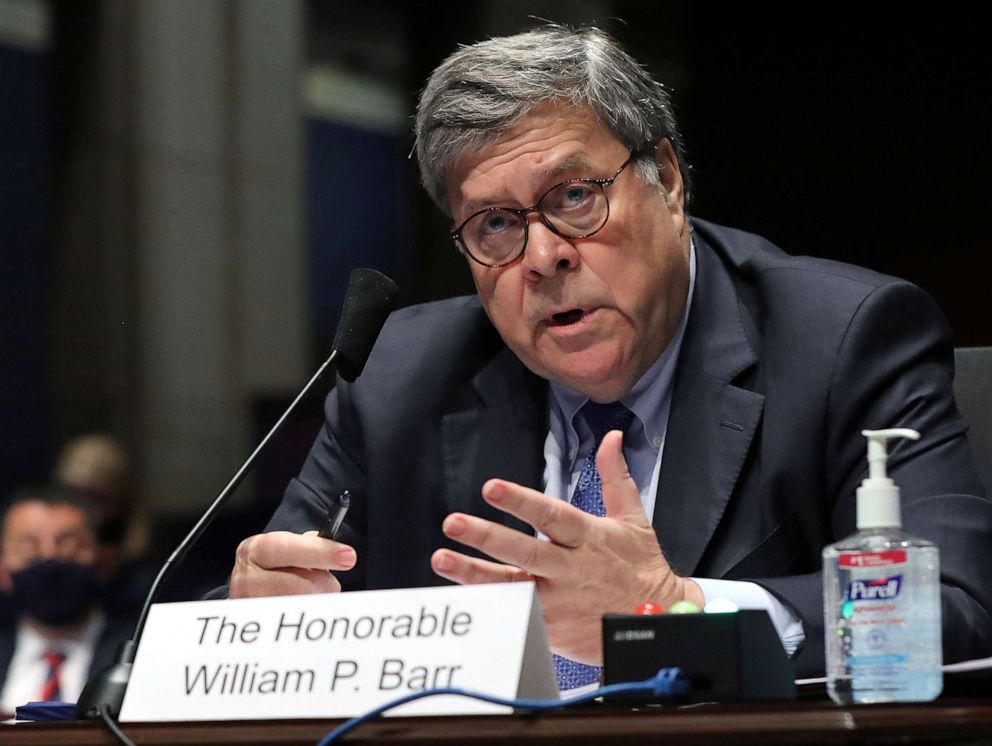
"As the Special Counsel’s report acknowledges, there is substantial evidence to show that the President was frustrated and angered by a sincere belief that the investigation was undermining his presidency, propelled by his political opponents, and fueled by illegal leaks," Barr said.
Barr later rejected accusations that he sought to minimize Mueller's findings to help Trump politically, and in a Senate hearing on the report said he found Mueller's letter to be "a bit snitty."
Yoo argued the criticism of Barr was "unfair" because he had no obligation to release the redacted report in the first place.
"Who cares what Bill Barr said about the report?" Yoo said. "The report recommended no prosecutions and then the report clearly tried to say in the second volume if anyone's supposed to take care of this it's Congress through their impeachment power so the most important thing Barr did was to agree to allow the report to come out in public."
Yoo has faced criticism in the past for his legal opinions crafted while he served in DOJ's Office of Legal Counsel during the George W. Bush Administration -- including the legal defense for enhanced interrogation of detainees captured in the War on Terror and other opinions that spelled out broad interpretations of executive powers.
While much of the new Democratic House majority viewed Mueller's obstruction findings as a clear roadmap to impeaching Trump, the political impact of Barr's statements as well as his later resistance to their demands to declassify certain aspects of the report and Mueller's underlying work products proved to be effective roadblocks.
On July 25, the day after Mueller appeared in front of Congress to testify on his report, Trump phoned Ukraine's President Volodymyr Zelensky where he discussed what he described as Mueller's "very poor performance," and said he would ask Attorney General Barr and his personal attorney Rudy Giuliani to get in touch with Zelensky about investigating former Vice President Joe Biden and his son Hunter.
Barr denied ever hearing about or acting in any way on Trump's suggestion. An intelligence community whistleblower complaint outlining details from the call led House Democrats to impeach Trump for abuse of power and obstruction of Congress -- while many Democrats publicly vented frustrations that Mueller's findings were not included in the articles of impeachment.
Investigating the investigators
Even as he was fending off accusations of acting more like a personal attorney for Trump than the nation's top law enforcement official, Barr was in the throes of a separate effort encouraged by Trump and his allies -- investigating the conduct of officials involved in starting the Russia investigation.
A month after the Mueller report's release, Barr tasked U.S. Attorney John Durham of Connecticut with investigating the FBI's original 2016 investigation, dubbed 'Crossfire Hurricane.' Months later, the department said that Durham's investigation had become a criminal inquiry.
A separate extensive investigation into Crossfire Hurricane by the DOJ's inspector general Michael Horowitz found that the investigated was launched with proper cause, while at the same time outlining damning findings about the conduct of FBI agents who had sought court-authorized surveillance of a former Trump campaign aide. Barr and Durham soon after released a joint statement, however, splitting with Horowitz's finding that the probe was properly predicated and stated their investigation was still ongoing.
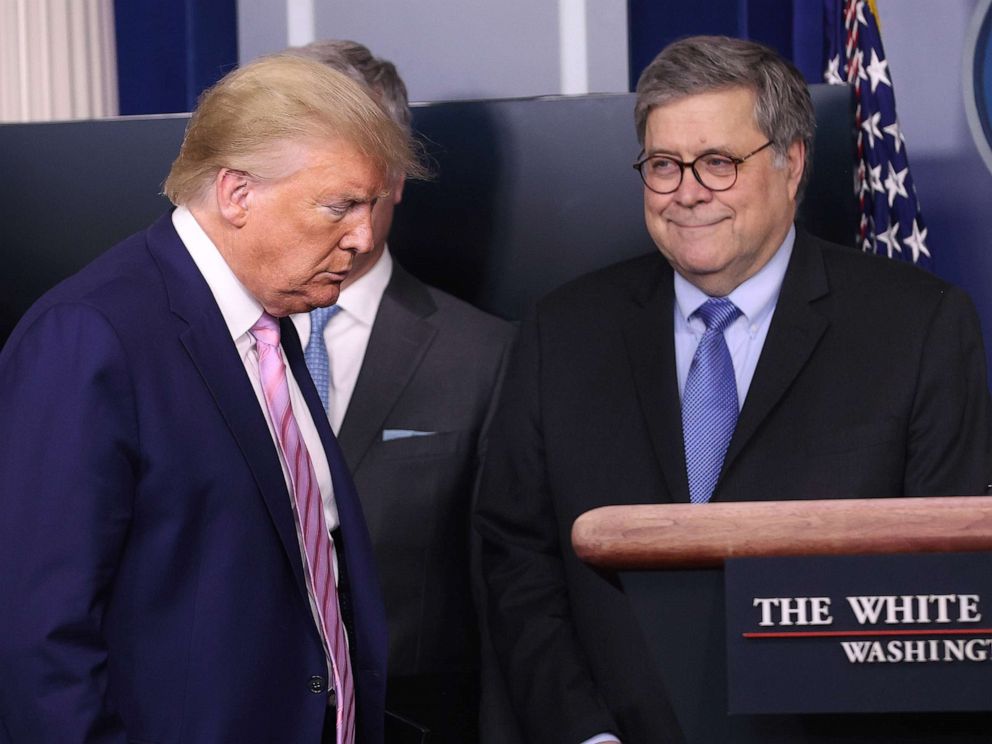
In interviews and public statements, Barr has repeatedly suggested Durham's investigation has only further bolstered his belief that Trump and many of his associates were victims of a witch hunt launched by politically motivated officials in the FBI and Justice Department. It's still unclear though, to what extent Durham has uncovered evidence of actual material violations of the law.
To date, his office has only returned one indictment against a mid-level former FBI lawyer, who pleaded guilty in August to altering a document the bureau used in getting court approval for the surveillance of former Trump campaign aide Carter Page.
In the weeks leading up to the presidential election, President Trump publicly called for Barr to release Durham's findings and announce charges against his political rivals.
Previously, Barr had made clear in an interview with ABC News in February that he believed no attorney general should take such action at the request of the president.
"If he were to say, you know, go investigate somebody because - and you sense it's because they're a political opponent, then an attorney general shouldn't carry that out, wouldn't carry that out," Barr said.
Instead, Barr quietly informed Republican lawmakers that no further action from Durham was expected prior to the election.
In a recent interview with the Associated Press, however, Barr revealed that in October he had appointed Durham as a special counsel -- which he said was intended to provide Durham with a layer of protection so his team could continue their work irrespective of the results of the election.
Barr said he had opted not to inform lawmakers of the appointment due to sensitivities around the election, though several Democratic lawmakers have already cried foul about Barr's motivations and publicly urged Biden to dismiss Durham upon taking office.
The appointment could prove to be a significant political headache for Biden and his eventual pick for attorney general, who, under the special counsel statute, would only have the authority to fire Durham if they have proper cause.
Barr stepped in for Trump allies
Though Trump in recent months grew increasingly frustrated with Barr as he refused to act on Trump's demands to manufacture a political bombshell that he could wield against his opponents in the presidential election, it reflected what had, up to that point, become a feature of Barr's tenure -- his willingness to repeatedly intervene in matters of direct interest to the president.
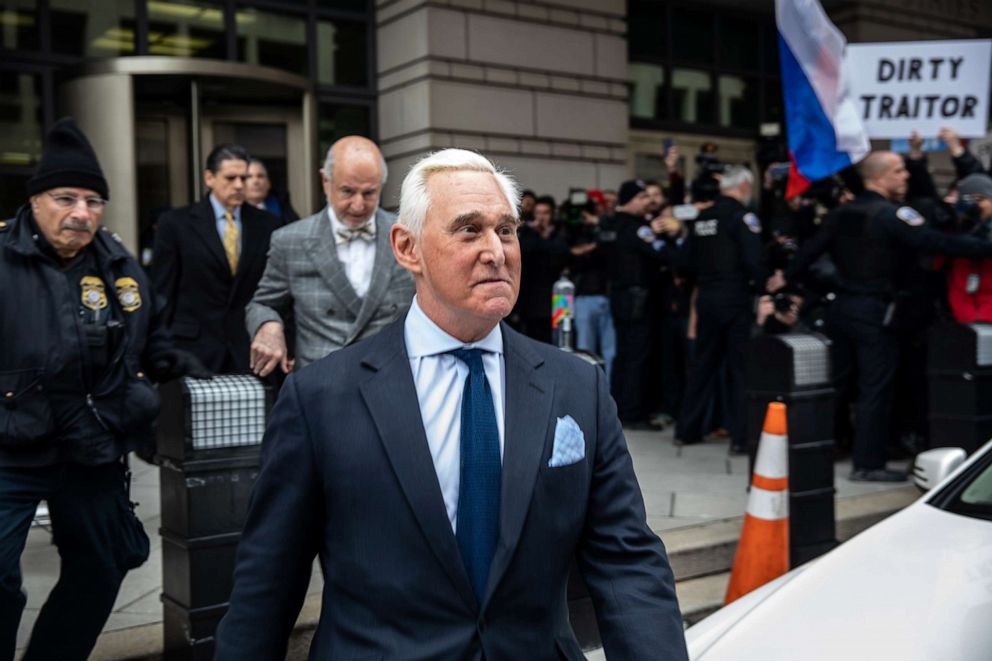
Barr's move in February to overrule the sentencing recommendation by federal prosecutors for Trump ally and self-professed 'dirty trickster' Roger Stone, came just hours after Trump had tweeted about the case saying, "cannot allow this miscarriage of justice!"
Stone was convicted of lying to Congress, witness tampering and obstruction of justice, and prosecutors had recommended he serve seven to nine years in jail in line with DOJ's sentencing guidelines. Soon after Barr's intervention, all four prosecutors quit the case in protest -- with one resigning from the department altogether.
In an exclusive interview with ABC News, Barr sought to tamp down the political firestorm over his decision by making a rare break with President Trump, telling ABC's Chief Justice Correspondent Pierre Thomas that Trump "never asked me to do anything in a criminal case" and that his tweets "make it impossible for me to do my job."
At the same time, Barr was set to involve himself in yet another case involving an ally of the president, former national security adviser Michael Flynn.
Flynn had already pleaded guilty twice in court to lying to the FBI about his contacts with the Russian ambassador during the 2017 presidential transition, but early in the year after hiring lawyer Sidney Powell he moved to withdraw his plea -- alleging widespread misconduct among the FBI agents who originally investigated him.
Barr later tapped U.S. attorney Jeffrey Jensen to review the circumstances surrounding Flynn's case, and in May made the extraordinary decision to move for the dismissal of the charge against Flynn. Barr said materials Jensen uncovered in the course of his review led him to believe that Flynn's lies to the FBI were not relevant to any legitimate investigation.
Asked in an interview whether he was doing the president's bidding, Barr answered, "No."
"I'm doing the law's bidding. I'm doing my duty under the law, as I see it," Barr said.
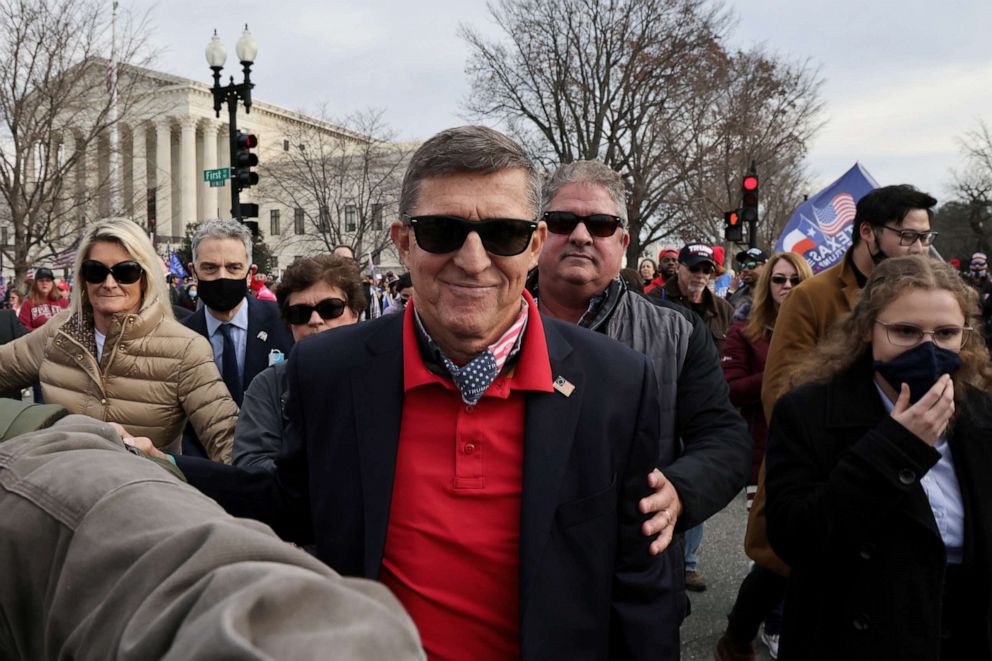
But the move was met with some skepticism from the federal judge overseeing Flynn's case, Emmet Sullivan. Sullivan appointed an outside former judge John Gleeson to argue against the department's motion to dismiss, and also to weigh whether Flynn may have committed perjury by reversing his earlier guilty plea.
Gleeson blasted the department in a filing, arguing there was "clear evidence that [their] motion reflects a corrupt and politically motivated favor unworthy of our justice system."
Sullivan was still weighing whether to accept the department's motion or move forward with sentencing Flynn when President Trump granted Flynn a full pardon on Nov. 25. In a ruling dismissing the case, Sullivan made clear he was highly suspect of the DOJ's motives and stated that just because Flynn was pardoned didn't mean he was "innocent."
Barr's actions in those cases raised alarm bells for many federal prosecutors, including Phillip Halpern, a 36-year veteran of the department who served as an assistant U.S. attorney overseeing the prosecution of former Rep. Duncan Hunter. Hunter was an early supporter of President Trump who was convicted on conspiracy charges and sentenced to 11 months in prison -- Trump publicly attacked the DOJ for bringing the case against him.
Halpern said in a phone interview that based on Barr's actions he opted to delay his retirement to ensure that there wouldn't be a similar action to undermine his team's prosecution of Hunter. Upon leaving the office he penned a scathing editorial speaking out against Barr.
"Can an Attorney General weigh in on an individual criminal case or individual criminal cases? Well, yeah, I think that can be done as long as it's being done for the right reasons in the right way," Halpern said. "What the people in the department were decrying and what prompted my editorial was the fact that he was doing it selectively on individual cases for transparently false reasons."
Pressed in an interview with NPR in June over whether he could name a case where he intervened "so dramatically" in which a person involved was not connected to the president, Barr couldn't name a specific instance.
"Off the top of my head, I'm sure there were a number of cases since I've been here that I've done that," Barr said.
DOJ targeted Trump critics
When President-elect Biden takes office on Jan. 20, the leaders he installs at the Justice Department will be tasked with deciding whether to move forward with several cases that were launched against outspoken critics of President Trump.
Federal prosecutors are engaged in a civil suit against former national security adviser John Bolton, alleging he violated a non-disclosure agreement when he didn't complete the pre-publication review process before releasing his memoir, 'The Room Where It Happened.' Bolton is separately under criminal investigation over whether he illegally mishandled classified information in violation of the Espionage Act.
Bolton has disputed that his book contains classified information and accused the DOJ of carrying out a political errand for President Trump, who has publicly cheered on their efforts targeting Bolton.
Barr has denied the department had any political motive in bringing the lawsuit.
Should the case move forward, it could spell real legal trouble for Bolton. A district judge in his civil case recently said he agreed with the government's argument that the book contained highly classified information after intelligence officials briefed him in a private setting on portions they had identified as potentially damaging to U.S. national security.
In a similar move in October, the Justice Department filed a civil lawsuit against Stephanie Winston-Wolkoff, a former top aide to first lady Melania Trump who released a tell-all book that included details of her private conversations with her and other White House officials.
The department said Winston-Wolkoff breached a non-disclosure agreement signed upon starting her role in the East Wing and indicated it will seek to seize any profits she may have received from publishing the book. While the DOJ has in past administrations brought lawsuits against individuals found to have violated their non-disclosure agreements that they signed upon entering government -- the Wolkoff lawsuit puzzled many legal experts as such cases are typically only brought over alleged disclosures of classified information.
The lawsuit against Wolkoff, however, doesn't allege she disclosed any classified materials -- instead citing details she published about personnel decisions in the first lady's office, information on the "Be Best" initiative and conversations she had with the president.
In a separate controversial effort, the department was rebuffed by a federal judge in October when it sought to replace itself with Trump as a defendant in a defamation suit brought by columnist E. Jean Carroll, who has alleged Trump raped her in the mid-1990s.

The DOJ has said Trump made his allegedly defamatory denials of Carroll's accusation while acting in his official capacity, a defense met with skepticism from district judge Lewis Kaplan.
"The president of the United States is not an 'employee of the government' within the meaning of the relevant statutes," Judge Kaplan wrote in his ruling last month. "Even if he were such an 'employee,' President Trump's allegedly defamatory statements concerning Ms. Carroll would not have been within the scope of his employment."
The department has sought to appeal Kaplan's ruling, and Barr previously defended the DOJ's decision to intervene in the case -- describing it as “a normal application of the law."
"The law is clear,” Barr said in a Chicago press conference. "The little tempest that is going on is largely because of the bizarre political environment in which we live.”
White House pressure campaign
Despite a laundry list of actions that had landed him among President Trump's most favored Cabinet members, Barr's relationship with Trump deteriorated in the months leading up to the 2020 election as he ignored the president's public pleas to announce investigations that Trump hoped to use for his political benefit.
“Bill Barr can go down as the greatest attorney general in the history of our country, or he can go down as an average guy," Trump told Fox Business host Maria Bartiromo in an August interview. "We’ll see what happens."
Barr instead kept quiet and made no public remarks until nearly a month after the election when he conducted an interview with the Associated Press.
In the interview Barr stated the department uncovered no widespread fraud that could overturn the results of the election. Afterwards he visited the White House and held what sources described as an "intense" meeting with Trump at the White House.
Two days later, in an exchange with reporters in the Oval Office, Trump declined to say whether he continued to have confidence in Barr.
"Ask me that in a number of weeks from now," Trump said.
In recent weeks, in fact, it was revealed Barr deliberately kept from making public at least two matters that would most certainly have been used by Trump and his allies as ammunition in their attacks against Biden's candidacy.
A statement from the Biden transition on Dec. 9 revealed that Biden's son Hunter is under active investigation by the U.S. attorney's office in Delaware for potential tax crimes -- an inquiry which a source told ABC News had been active since 2018. Separately, Barr's revelation that he had appointed Durham as a special counsel came as Trump had openly vented in an interview that Durham made no major moves prior to the election.
"Even though he wanted to restore control, in the 'little-p' political sense, of federal law enforcement, he still wanted to keep the government out of partisan politics," Yoo said.
Whether Barr's efforts to empower politically-appointed officials in the Justice Department will have any lasting impact once President-elect Biden takes office remains to be seen.
Biden has recently indicated a key priority for his administration will be establishing a clear barrier between the affairs of the Justice Department and the West Wing, which critics of Barr argue was virtually eliminated through the course of his tenure.
"I'm not going to be telling them what they have to do and don't have to do," Biden said in a recent interview with CNN. "I'm not going to be saying go prosecute 'A, B or C' -- I'm not going to be telling them. That's not the role, it's not my Justice Department, it's the people's Justice Department."
Former officials who spoke to ABC News argue that such a 'return-to-normalcy' approach makes it all the more important who Biden inevitably selects as his attorney general, with former deputy attorney general Sally Yates and former Sen. Doug Jones, D-Ala., believed to be currently at the top of his short list.
"What actually needs to be done is not changing the way things have historically been done," Ayer said. "It's to reaffirm the way things have historically been done. It's an interlude here of mostly just the two-year period of Barr's tenure where a lot of these norms have been fractured and ignored.




